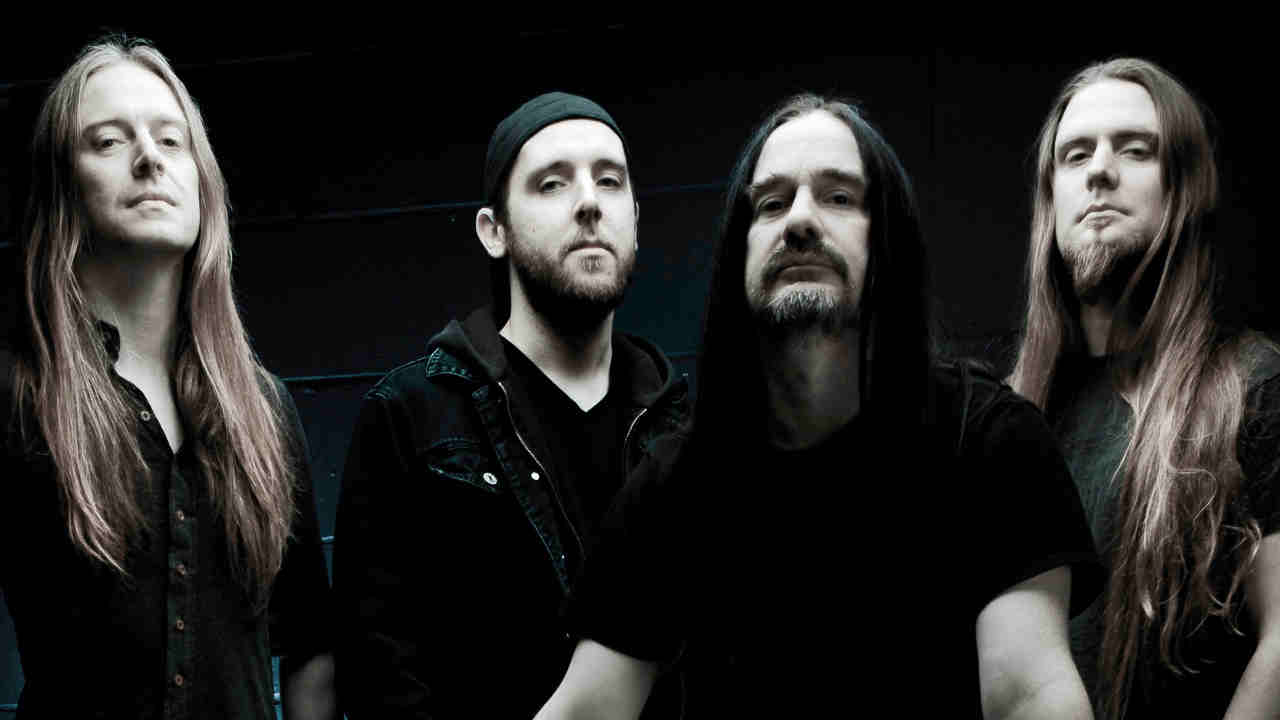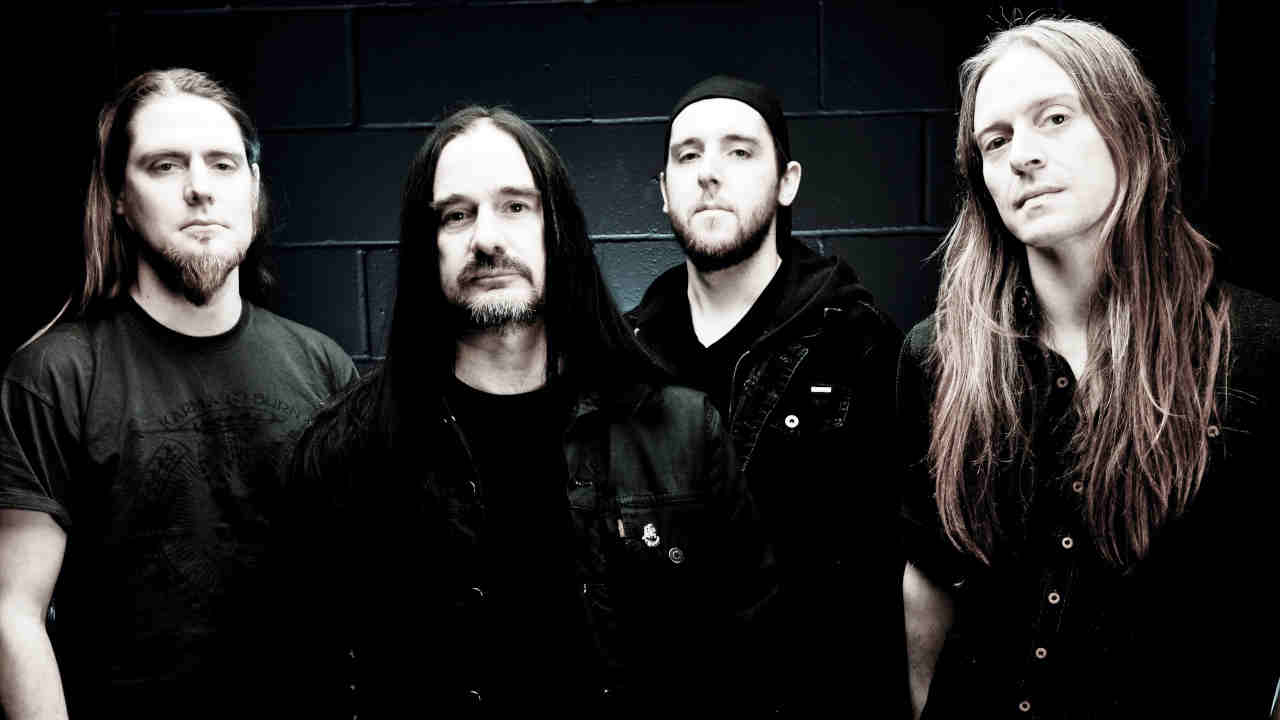
With albums such as Symphonies of Sickness, Necroticism – Descanting the Insalubrious and Heartwork, UK sickos Carcass helped draw up the template for so much modern extreme metal. But after splitting in the wake of 1996’s Swansong, it would be another 17 years before they released a new record in the shape of 2013’s Surgical Steel. Singer/bassist Jeff Walker and guitarist Bill Steer sat down with Metal Hammer at the time to talk splits, reunions and the state of metal.
Reunions are 10-a-penny these days. Just about every dreamer who ever lugged an amp into a van has got his old band back together by now, buoyed up by the raised fortunes of heavy metal and nostalgic yearning for the follies of youth. Even so, there are some names even the most optimistic headbanger never again expected to see on an LP of original material. One such name was Carcass.
Arguably Britain’s most important and awe-inspiring extreme metal group, after an astonishing trajectory of innovation and refinement over 10 years circa 1985-95, this perennial outsider band acrimoniously imploded with such force that singer/bassist Jeff Walker and guitarist Bill Steer virtually fled the metal scene for 17 years. Jeff surfaced as El Cynico, playing bass for grind supergroup Brujeria, and Bill embarked on a musical journey back to the Mississippi delta, helming his own excellent blues rock combo Firebird. Meanwhile drummer Ken Owen suffered a brain haemorrhage in 1999 which depleted his drumming ability. Even when Jeff and Bill reformed Carcass in 2007 with Arch Enemy guitarist Mike Amott and drummer Daniel Erlandsson, to play their much-coveted 90s material for the festival circuit, few expected it to be a permanent concern, least of all Bill.
“I really couldn’t imagine the band ever coming back,” admits the guitarist, “because it ended in such unpleasant circumstances. The whole scenario around Swansong wasn’t very nice, we weren’t getting on at all. Musically there were good ideas but it didn’t hang together. So the band folded, and probably I was the most bitter about it. My way of dealing with it was to go away and do something completely different. But sometimes it’s hard to escape the monster you created! We’ve done other things with other bands, and it’s been really enjoyable, but Carcass is such an important thing to the pair of us, it goes back to our teenage years. It’s always going to mean more to us than anything else we do. I guess I was ready for it again; the challenge was there as well. Quite early on we realised it was flowing very naturally, and it definitely sounded like Carcass. So we got stuck in. It was a load of fun, the whole process.”
How hard was it to dream up new Carcass material again after so long?
“It’s a case of getting in that headspace again,” Jeff explains. “What does Rick Rubin do when he produces bands nowadays? He just tells them to get back in touch with what motivated them when they started. I said to Bill, we can either pay Rick Rubin a million dollars or we can just say, ‘Let’s go back to our roots!’ And it’s the same with the lyrics – it’s getting back into the attitude of the early 90s.”
“I spent so long playing that music, every day for years, that it’s just part of my DNA,” reckons Bill. “I think there’s a freshness to the material for that reason. Neither of us had done anything creatively in that style for all that time, so I suppose, without realising it, we had plenty of time to figure out what we wanted to hear from a death metal album. I think the pair of us work well together, we’ve known each other a long time. We’re quite different characters but there seems to be some sort of chemistry that works.”

Surgical Steel is certainly a powerful testament to the abiding Steer/Walker chemistry, but in the classic Spinal Tap analogy, if Jeff is fire and Bill is ice, Ken always seemed to be lukewarm water. The much-loved drummer couldn’t take part in the reunion due to his illness – though he adds backing vocals to the new album – and his replacement for initial live shows, Daniel Erlandsson, left Carcass with Mike Amott in 2010, both men unable to commit further to Carcass with Arch Enemy as their first priority. This meant finding another new drummer. Did the band relish finding new blood at this stage, or was it a process they dreaded?
“Nah, it was a piece of piss!” snorts Jeff. “It’s all part of the puzzle of the reason we’ve done this. We toured the States in 2008 and Dan Wilding was in the support band Aborted, he came to our attention then. I think he was only 18! Bill has a good feel for these things, I think he knew from the start that it would work.”
“I happened to step up to the side of the stage and caught some of Aborted’s set,” remembers Bill, “and I was very impressed with their drummer. I logged him in my head as the suitable drummer if we ever had problems with Daniel Erlandsson. So when Jeff and I started working on tunes in 2011, I put Dan forward. He’s exceptional, he’s definitely one of the best musicians I’ve ever played with. He’s played in a ton of different bands all over the world, so he’s found ways to adapt. I wouldn’t want to underestimate how much he contributed, actually; not just by being a killer drummer,but he had some cool ideas about arrangements and different ways to phrase the drum parts.”
Recording the album as a trio for the first time since 1989’s Symphonies Of Sickness, the band knew they needed a second guitarist for live duties, and one was found in the form of ex-Pig Iron/Liquefied Skeleton axeman Ben Ash.
“I actually approached Jesper from In Flames to see if he was interested, and he was, but that fell through,” reveals Jeff. “Then I was talking to Gary Holt and he was saying he’d have done it, so I did ask if he’d be interested and he said yes – but then the Slayer thing came along! And everything’s turned out for the best. Gary’s great in Slayer, and Ben’s right for this band. It’s great to have a British lineup again; not for some nationalistic reason, it’s just good that we’re all in the same country and we all share the same sense of humour.”
Recording across a number of “sporadic” sessions between August 2012 and January 2013, the studio time was financed entirely by Jeff and Bill themselves, prior to shopping a rough mix around various labels – most enthusiastic of whom were Nuclear Blast.
“We had enough confidence in what we were doing that it wasn’t really a gamble, you know, it was a surefire bet,” Jeff asserts. “It was all about not having a label dangling a carrot in front of you. We’ve done this to prove a point, and as an artistic statement. It’s not a business decision to do an album for the sake of careerist bullshit: we’ve done an album because we wanted to prove that Carcass are still a viable force.”
“We didn’t want any interference,” Bill agrees. “The metal scene has changed a lot; I hear things from various people in the business now that just mortify me. We’re really keen to step away from that. We didn’t start playing this music to win popularity contests. To us, metal was a small scene populated by outsiders: that’s what brought a limited number of people together to start this all off.”
“You could say we’re misguided middle- aged men who are irrelevant and out of touch, but we know what Carcass should sound like!” insists Jeff. “There are so many bands who’ve been influenced by us, even if they don’t fucking know it. So many bands have taken stylistic cues off us and made careers from it. But only we know how to deliver the full package, and I think this album proves we weren’t talking out of our asses.”
One of the “mortifying” trends in modern metal for these “misguided middle-aged men” is the preponderance of technological studio trickery. “We’ve refused to get dragged into playing to a click-track, quantising the drums, all that bullshit,” sneers Jeff. “We wanted a soulful-sounding, organic album where it’s not meant to be perfect. If you play to a click-track it turns into nothing more than a computer game soundtrack. And people are judging music through clips on YouTube or mp3, on fucking PC speakers or shitty iPod headphones, you’re not getting the full dynamic range! That’s the world we live in these days, and I guess artists are deliberately tailoring their music towards these gadgets. But we felt very strongly about this, this is one of the things that’s ruining modern metal! Technology is meant to help you, it’s not meant to be a crutch that you rely on. Dan’s a naturally gifted drummer anyway – he doesn’t need a click-track. There are a lot of drummers who don’t need one, who get so used to it they don’t feel comfortable without it.”
“One of the main things I’m always looking for is flow,” Bill explains. “And even something as crazy as death metal with all its time changes can be quite jarring, but the human element is on there, this isn’t some Pro-Tooled monstrosity where everything’s perfectly in time and in tune. Metal production and pop production have met in the middle. It’s all level, nothing jumps out at you, and often you’re listening to a contemporary metal record and you don’t know how good the musicians are because everything has been messed with so heavily. So that was important to us, to sound like ourselves. I know [original producer] Colin [Richardson] wasn’t 100 per cent comfortable with that when we told him. There were times in the sessions when I think they wished they could have just copy-and-pasted the odd chorus!”
The band have another five or so songs in the can, and Bill says they had to force themselves to stop writing. “It feels like we just got started,” he laughs. “Every time you go into the studio you learn a few things, and it’s a natural impulse to want to go right back in while you can still remember it all! There’s still loads of ideas left.”
“There’s still unfinished business as far as I’m concerned,” Jeff agrees. “I can see another album in us. As long as you’re not struggling to come up with music – there are so many bands who have a contract and just go through the motions every year recording and touring, just because it’s their business. We’d stop tomorrow if we felt we’d fulfilled our need to do this.”
Originally published in Metal Hammer issue 248







